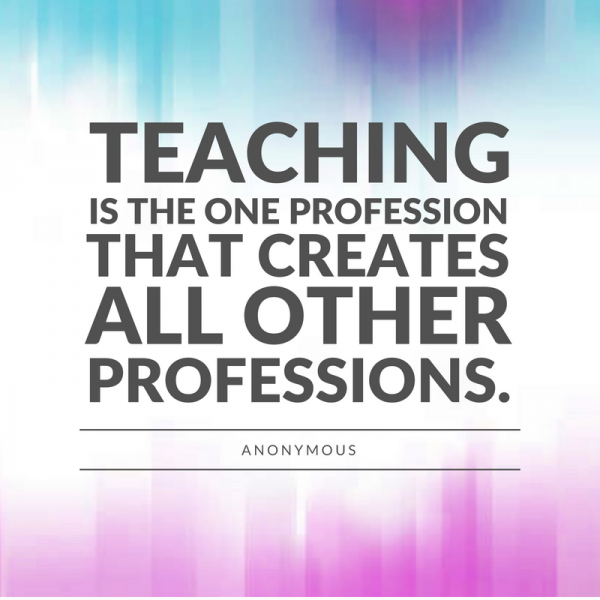
“Teaching is the one profession that creates all other professions.”
–Anonymous
Happy Teacher Appreciation week, friends!

“Teaching is the one profession that creates all other professions.”
–Anonymous
Happy Teacher Appreciation week, friends!
[Following up on the post from last week about helping students play with expression…here’s another analogy I use with young piano students who need to think “beyond the notes”.]
If playing the piano was about merely pressing the right buttons at the right time, we might as well hire robots to do it for us.

It’s funny to imagine, isn’t it? But really: Why would you bother taking piano lessons if you could have a robot play your pieces?
What’s the difference between a robot playing the piano and YOU playing the piano?
The answer has to do with the fact that music isn’t just about “the right notes at the right time.” Music is about expression. Instead of just learning how to get the notes and rhythm correct, we can learn how to make your piece sound like popcorn, or birds, or a storm, or thousands of other things. To me, this is the fun part! This is the best part of about making music.
So, let’s talk about expressive music making. How would a robot play this piece? How would YOU play this piece?
What can you do to make this piece sound more like the subject suggested by the title? Why do you suppose the composer chose these dynamics and articulations for this piece? What else can you do to make the piece sound more like the title?
Only YOU can play the piano like you do. Don’t be a robot at the piano!


Hi there!
Today, I just wanted to share a little bit more regarding the retreat for piano teachers I’m planning in August 9-11, 2018.
The topic our retreat will be centered around is: Developing Piano Technique in Beginners.
I don’t know about you, but I don’t always find it easy to help my beginner students form a happy, healthy technique. Sometimes, in those early years they play with awkwardness or too much tension. The tone they produce at the piano sometimes comes out weak-sounding, or harsh. If they form habits for playing this way, it could lead to tension or even pain down the road.
We all want our students to play comfortably, without struggle, and producing a beautiful sound. It takes a watchful eye, time, and patience to help them learn to play with ease, naturalness, and a beautiful tone. I’m always looking for tips and strategies to help my student with this, and I’m sure you are too! I would love for every one of my students to play comfortably and beautifully at the piano.
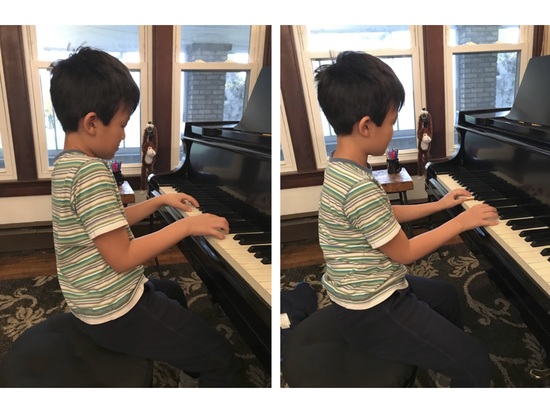
Here’s a photo of my student, Robbie, playing his piece after we talked together about finding his “sit bones” and thinking about “head forward and up”. You can really see the difference in his shoulders!
These are the sorts of things we will be discussing during my piano teacher retreat this summer. I invite you to consider joining us! This is an experience designed around attendees sharing their insights and exchange teaching tips and strategies. Through combining our knowledge and experiences, we will all benefit from the collective wisdom. I can’t wait!
Here’s the full description of the event:
Retreat at Piano Manor is a three-day experience for piano teachers to get-away to connect, share, and become better teachers for our students. Together, we will explore how we can ensure our students each develop a healthy, happy piano technique from the beginning. Attendees will be expected to share their best tips and insights, and participate in group projects researching the various schools of thought when it comes to piano technique. A highlight of the retreat will be a session by guest speaker Nancy Crego disseminating the Alexander Technique. While at “Piano Manor,” you’ll also enjoy relaxing downtime and deliciously healthy food planned by my foodie friend, Amy Chaplin of PianoPantry.com.
At the end of three days, you’ll leave equipped with new perspectives and teaching strategies for not only avoiding playing-related injuries or discomfort down the road, but enabling even beginner students reach their fullest potential as pianists. You will know when and how to intervene with a student’s use of themselves at the piano, so your students develop musical skills without undue effort. You’ll be equipped with the confidence and strategies to help your students prevent discomfort and experience ease at the piano, so they can play happily and healthily. Retreat at Piano Manor will leave you feeling inspired and connected, with newly formed friendships and fresh ideas for your teaching.
If you are interested in attending the retreat, read more here and then please be sure to join this special email list. Registration information will be sent out in upcoming weeks.
If you can’t attend the retreat this year, don’t worry: I’ll be sharing highlights in weeks ahead — of both the preparation process as well as the actual retreat activities. Watch my blog or instagram for updates!
Thanks for reading.
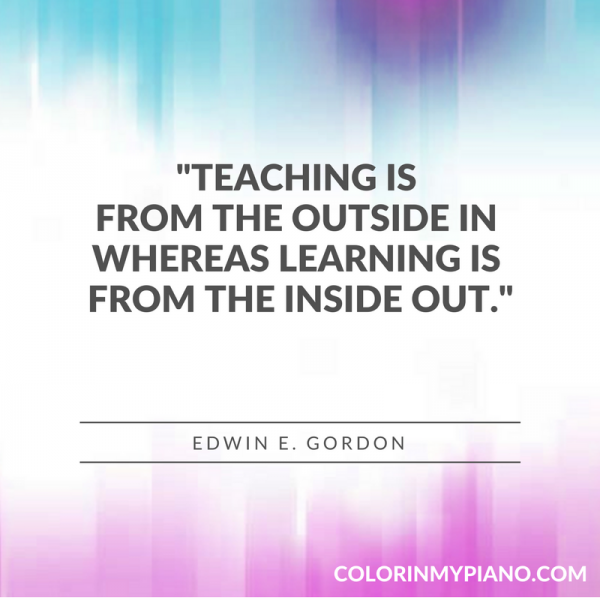
“Teaching is from the outside in whereas learning is from the inside out.”
–Edwin E. Gordon
 For piano teachers, it’s that time of year: recital season! We are in the process of coaching our students to polish and perfect their recital selections.
For piano teachers, it’s that time of year: recital season! We are in the process of coaching our students to polish and perfect their recital selections.
Does it ever feel to you like sometimes students have set the bar at only playing the right notes? Haven’t our students realized there more to music than this? I don’t know about you, but I didn’t sign up to be a piano teacher to become the “rhythm police”. 😉
We want our students to realize there is more to sharing music through performance than “getting it right”. They’ve set the bar too low. And perhaps at times we inadvertently reinforce the idea that this is all there is to piano playing.
There’s no doubt it’s important to perform a piece with accuracy. But we don’t want students to think their job is complete upon merely being able to play “the right notes at the right time”, when the reality is that even our youngest students are completely capable of getting “beyond the notes”.
Instead, we want our students to play with heart, to play with expression and individuality. We want our students to be confidently play their hearts out, and deliver a performance that moves their listeners.
Today, I’ll share a simple analogy I use to help students (1) understand what it means to get “beyond the notes” and (2) become motivated to attend to the details of and add expression to their performance. Continue reading “Decorating the Cake: Helping Piano Students Play With Expression and Heart”
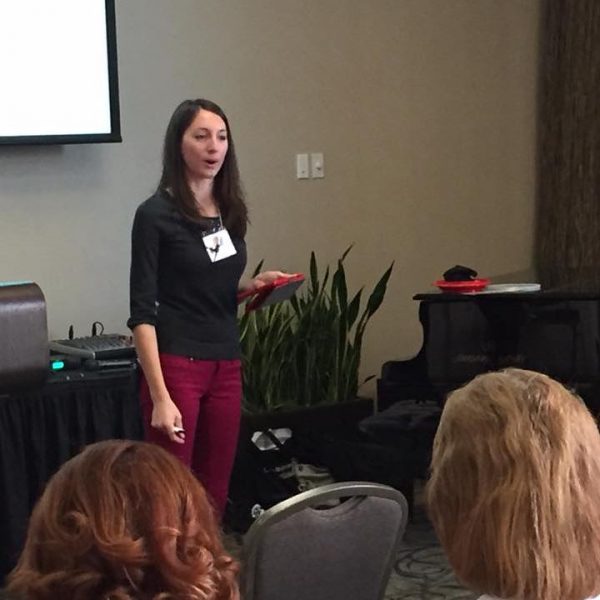 There was once a time when public speaking was entirely unappealing to me. It’s funny how things can change! I now know that public speaking is not that scary. 🙂 And I’ve always loved the process of researching a given topic and figuring out how to synthesize and organize the information. So, over the past few years, I’ve enjoyed being a presenter for various music teachers association meetings and conferences.
There was once a time when public speaking was entirely unappealing to me. It’s funny how things can change! I now know that public speaking is not that scary. 🙂 And I’ve always loved the process of researching a given topic and figuring out how to synthesize and organize the information. So, over the past few years, I’ve enjoyed being a presenter for various music teachers association meetings and conferences.
Now that the school year is wrapping up, I thought it’d be fun to take a look at the presentations I had the privilege of giving this year.
Over the summer, my buddy Amy Chaplin and I created a presentation for teachers new to Edwin Gordon’s Music Learning Theory (MLT). (Remember when Amy and I took our MLT certification training together back in 2016?) We first presented it for my local MTNA chapter, the Wood-Ottawa Counties MTA, here in Ohio in September. Then, we presented it again in Amy’s home state for the 2017 IndianaMTA state conference in Marion, Indiana. I’m proud of how our presentation turned out, and I hope we can present it more in future years!
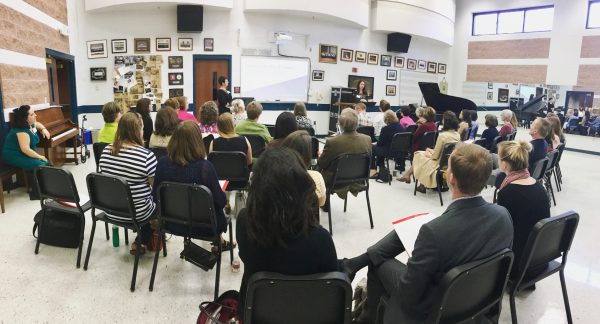
Our session is titled: “Teaching the Way We Learn: Applications of Gordon’s Music Learning Theory”.
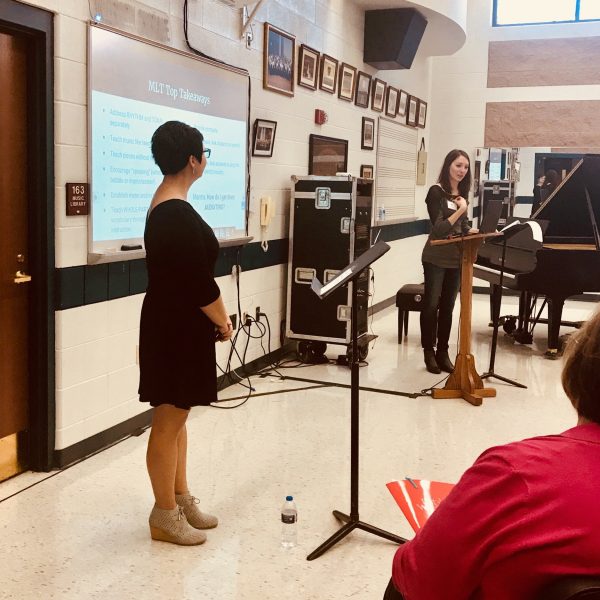
In October, I presented a presentation entitled: “Grounded in the Beat: Cultivating the Seeds of Rhythmic Fluency” to my state conference, for the 2017 OhioMTA State Conference in Van Wert, Ohio. This presentation discusses cultivating rhythm from an MLT-based perspective in our students. Continue reading “Looking Back: 2017-2018 Speaking Engagements”
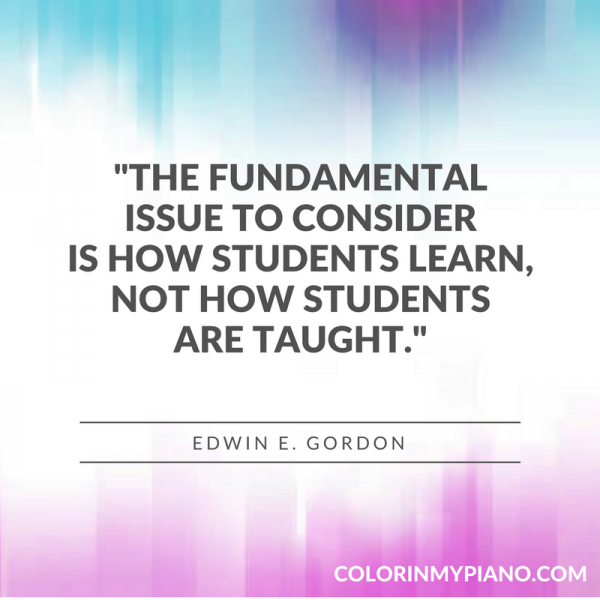
“The fundamental issue to consider is how students learn, not how students are taught.”
— Edwin E. Gordon
Last month, I visited my friend Christina Whitlock’s studio in Muncie, Indiana to give her students a masterclass. This month, she traveled MY way to give a masterclass for my students.
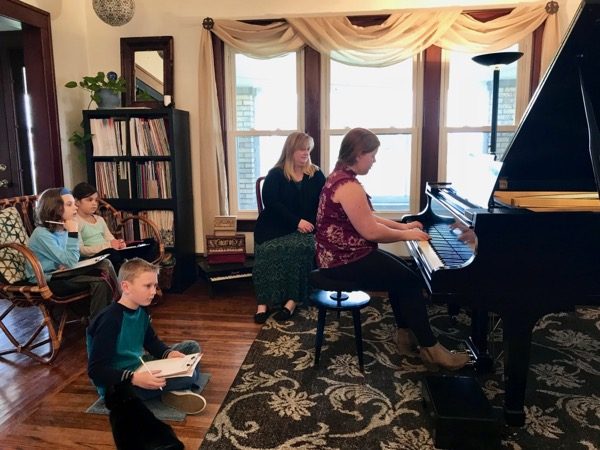
My students each performed their recital piece for Christina and received one or two pieces of advice for improving.
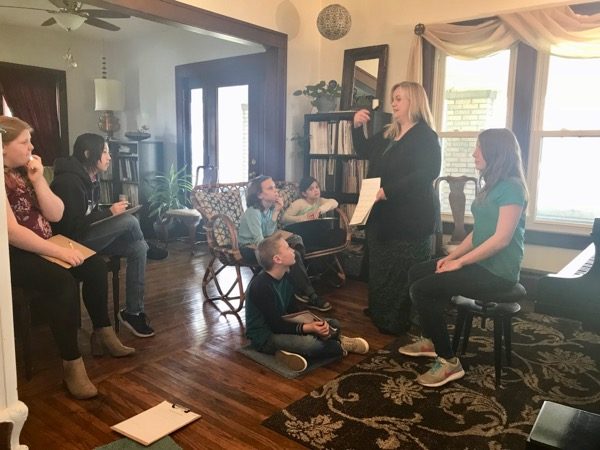
It’s so good for them to experience playing for another teacher. And it’s good for me as a teacher to hear another teacher’s perspective! Continue reading “2018 Masterclass Exchange – Part 2”
Many congrats to Paulette H., winner of the recent giveaway for the Tonic game!

Thanks to all who entered the giveaway. I loved reading all of your improvisation tips.
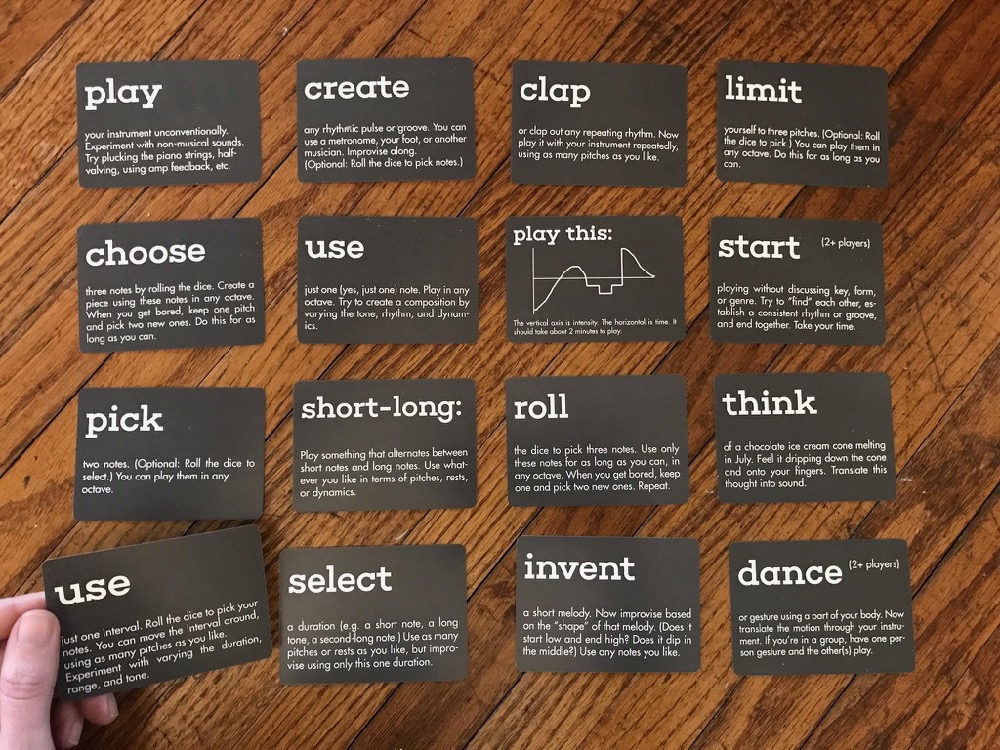
To go back to my full review of the Tonic game and read all of the comments, click here. If you’re ready to purchase the Tonic game for your students, order it from Scott Hughes’ website here.
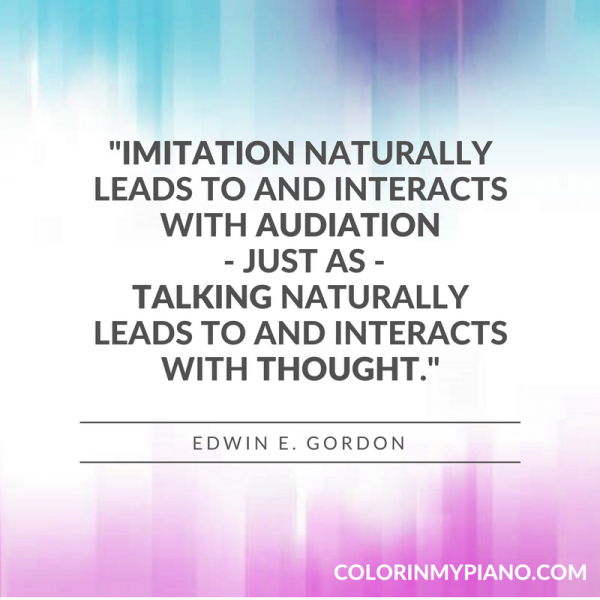
“…IMITATION naturally leads to and interacts with AUDIATION just as TALKING naturally leads to and interacts with THOUGHT.”
— Edwin E. Gordon
Do you have “student recital” on your mind? Tis the season! I have a simple printable to share today that I use to help gather program information in the weeks prior to student recitals.
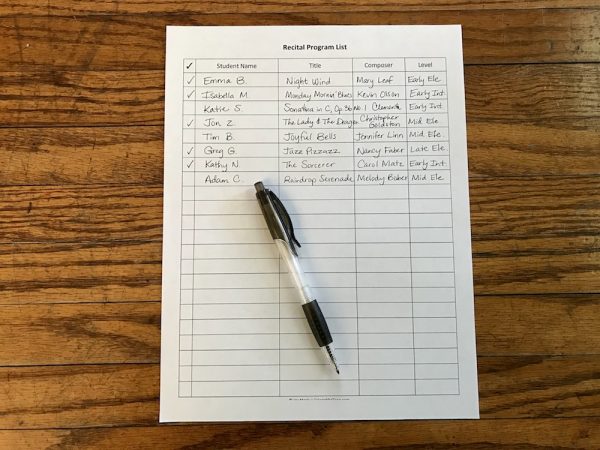
Here’s how I use it:
To download the printable, click below or visit the Printables > Other Resources page.
 Recital Program List (38.1 KiB, 2,462 hits)
Recital Program List (38.1 KiB, 2,462 hits)
Just thought I’d pass along information about the Gordon Institute for Music Learning (GIML) training that is to occur this summer (July-August, 2018) in the Boston area at Brookline Music School.
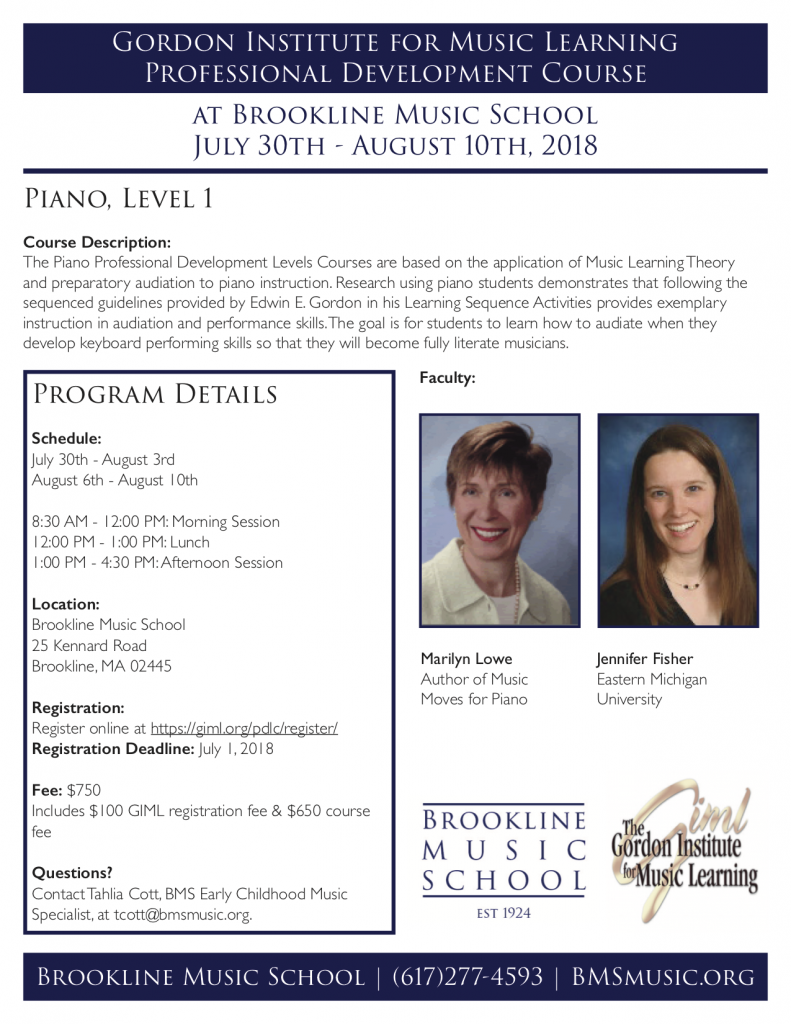
This is the certification I received in the summer of 2016 to learn more about applying Edwin Gordon’s Music Learning Theory (MLT) to piano teaching. It was quite a commitment of time and money but I feel it is the most important investment I have made into myself as a piano teacher, aside from earning my music degrees.
Here’s where you can read about my experience taking GIML’s Piano Certification Course. Read more about GIML’s Professional Development Level Course offerings here.
Your Cart is Empty